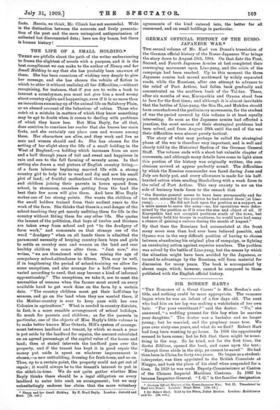THE LIFE OF A SMALL HOLDING.* THERE are pitfalls about
the path of the writer endeavouring to frame the slightest of novels with a purpose, and it is the
best compliment we can make to the author of Nancy and her Small Holding to say that she has probably been unaware of
them. She has been conscious of wishing very deeply to give her message, and she has chosen the vehicle of fiction in which to utter it without realising all her difficulties,—without recognising, for instance, that if you are to write a book to interest a countryman, you must not give him a word wrong about country sights and happenings, even if it is no more than an incautious summing up of the animal life on Salisbury Plain, or an absurd account of the behaviour of robins. Those who catch at a mistake in matters of which they know something may be apt to doubt when it comes to dealing with problems of which they know less. But Miss Bayly, for all that, does contrive to convince her render that she knows her main
facts, and she certainly can place men and women among them. Her characters are alive, and they work and live as
men and women should and do. She has chosen for the setting of her slight story the life of a small holding in the West of England,—a holding which increases from an acre and a half through years of toil and sweat and happiness in
rain and sun to the full farming of seventy acres. In that setting she draws a real picture of English country living,—
of a farm labourer beginning married life with a strong country girl to help him to weed and dig and sow his small plot of land ; of fruitful motherhood through twenty years, and children joining their parents in hours spared from school, in strenuous, ceaseless getting from the land the best their few acres will give them. And here Miss Bayly makes one of her strong points. She wants the children of the small holders trained from their earliest years to the work of the farm. She thinks that tbere is a. real danger of the school-teaching they get merely unfitting them for life in the country without fitting them for any other life. She quotes the lament of the politician, that boys of twelve and thirteen are taken away from school and put "to the drudgery of farm work," and comments on that strange use of the word " drudgery " when on all hands there is admitted the paramount necessity of keeping country-born boys and girls to settle as country men and women on the land and rear healthy children to come after them. "Just now," she writes, " we are threatened with a law raising the age of compulsory school-attendance to fifteen. This may be well, if in lengthening the period of school-training we allow for some exceptions, and also arrange for a half-time system, varied according to need, that may become a kind of informal apprenticeship." The exceptions, we take it, are to meet the necessities of seasons when the farmer must crowd on every available hand to get work done on the farm by a certain date. " The country children must get their • half-time by seasons, and go on the land when they are wanted there, if the Mother-country is ever to keep pace with her own Colonies in agriculture." What is needed in country districts, in fact, is a more sensible arrangement of school holidays.
So much for parents and children; as for the parents in particular, one of the objects of Miss Bayly's little volume is
to make better known Miss Octavia Hill's system of arrange-
ment between landlord and tenant, by which so much a year is put aside by the landlord for repairs, the amount calculated on an agreed percentage of the capital value of the house and land; then at stated intervals the landlord goes over the property, and if the tenant has kept it in good repair the money put aside is spent on whatever improvement is ohosen,—a new outbuilding, dressing for fruit-trees, and so on. Thus, up to a certain point, the property could not get out of repair ; it would always be to the tenant's interest to put in the stitch-in-time. We do not quite gather whether Miss Bayly thinks there should be a legal obligation on every landlord to enter into such an arrangement; but we may unhesitatingly endorse her claim that the more voluntary
• Nancy and her Small Holding. By E. Boyd Bayly. London : Jerrold and Bons. [le. net.]
agreements of the kind entered into, the better for all concerned, and on small holdings in paiticular.






































 Previous page
Previous page